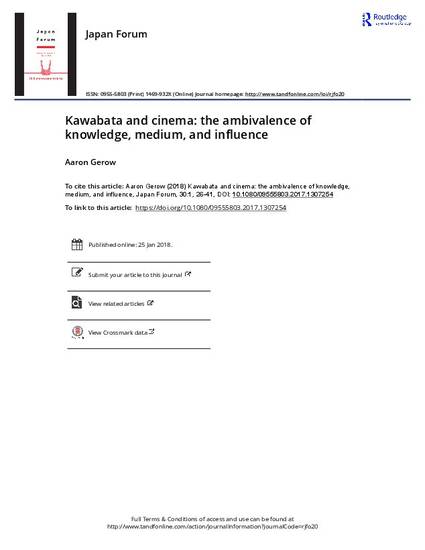
Article
Kawabata and Cinema: The Ambivalence of Knowledge, Medium, and Influence
Japan Forum
(2018)
Abstract
Many researchers have considered the involvement of Kawabata Yasunari in cinema and the medium’s possible influence on his literature. Such approaches, however, tend to assume a definition of the motion pictures as visuality or montage that then influences Kawabata instead of first considering Kawabata’s own conception of cinema, his own film theory. By analyzing his writings on film, including his film criticism, short stories involving cinema, and his involvement in the film A Page of Madness, this paper outlines Kawabata’s conception of cinema and argues that he developed a portrait of cinema that posed it as a challenge to identity, perception and knowledge itself. Often associated with the female body, the movies became to Kawabata both an object of fascination and a threat, something ultimately to be controlled through literature and the literary subject. What influenced his literature was then perhaps this perception of cinema as posing an epistemic crisis. It is his ambivalence towards this challenge that can serve as a key for elaborating on Kawabata’s complicated location within prewar modernism.
Keywords
- Yasunari Kawabata,
- film theory,
- film and literature,
- Kurutta ichipeiji
Disciplines
Publication Date
January 25, 2018
DOI
10.1080/09555803.2017.1307254
Citation Information
Aaron Gerow. "Kawabata and Cinema: The Ambivalence of Knowledge, Medium, and Influence" Japan Forum Vol. 10 Iss. 1 (2018) p. 26 - 41 ISSN: 0955-5803 Available at: http://works.bepress.com/aarongerow/18/